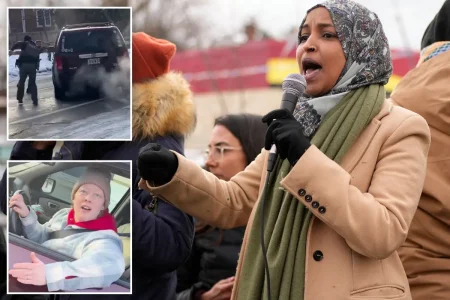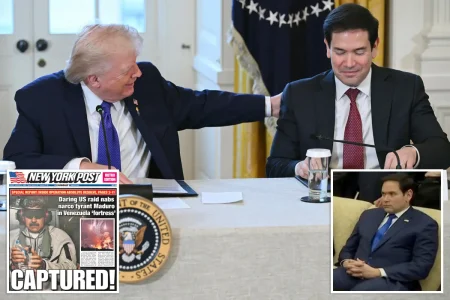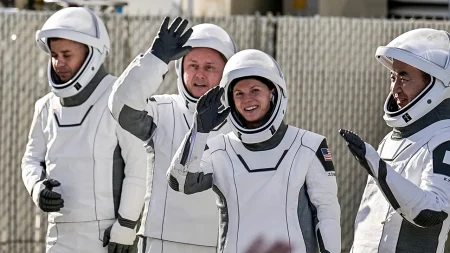Saudi Crown Prince Visits Washington: Military Contracts and Strategic Partnerships on the Agenda
Trump Administration Rolls Out Red Carpet for Saudi Arabia’s Rising Leader
In a significant diplomatic engagement that underscores the evolving relationship between Washington and Riyadh, President Donald Trump welcomed Saudi Arabia’s Crown Prince Mohammed bin Salman to the White House today. The high-profile meeting marks another chapter in what administration officials describe as a rejuvenated alliance between the two nations, following years of strained relations during the previous administration. The young crown prince, often referred to by his initials MBS, arrived amid substantial fanfare as both nations signal their intention to strengthen military, economic, and strategic cooperation across multiple fronts.
The centerpiece of today’s discussions focuses on major defense contracts that could potentially be worth billions to American aerospace and defense manufacturers. According to sources familiar with the negotiations, Saudi Arabia is exploring the purchase of advanced fighter jets and missile defense systems as part of its broader military modernization program. “This visit represents a tremendous opportunity for American workers and American companies,” said President Trump during brief remarks to reporters in the Oval Office. “The Kingdom has been a great partner in our efforts to create jobs and strengthen security across the Middle East region.” Defense industry analysts note that companies like Lockheed Martin, Boeing, and Raytheon stand to benefit significantly from any agreements finalized during the crown prince’s visit. The potential deals come as Saudi Arabia continues to expand its military capabilities amid regional tensions, particularly with Iran, a mutual adversary of both Washington and Riyadh.
Economic Partnerships and Vision 2030: Beyond Military Cooperation
While defense contracts have captured headlines, the discussions extend well beyond military hardware. Crown Prince Mohammed bin Salman, who serves as the kingdom’s de facto ruler, has been the driving force behind Saudi Arabia’s ambitious “Vision 2030” reform program – a comprehensive plan to diversify the oil-dependent economy and modernize Saudi society. “What we’re witnessing is not just about fighter jets and weapons systems,” explained Dr. Samantha Reynolds, Director of Middle East Studies at Georgetown University. “This is about the United States potentially playing a major role in Saudi Arabia’s economic transformation.” American technology companies, investment firms, and energy corporations are reportedly eager to secure positions in what could become the most significant economic restructuring in the kingdom’s history. The crown prince has been actively courting U.S. business leaders, with additional meetings scheduled on Wall Street later this week where he is expected to discuss investment opportunities in technology, entertainment, and renewable energy sectors.
The timing of this diplomatic engagement is particularly noteworthy, coming amid fluctuating oil prices and ongoing discussions about energy policy. Saudi Arabia, as the world’s largest oil exporter, maintains significant influence over global energy markets. “The administration sees strengthening ties with Saudi Arabia as critical to ensuring economic stability in energy markets,” said former State Department official Thomas Richardson. “Both nations recognize their mutual interests in maintaining predictable oil prices that support economic growth without creating inflation pressures.” The discussions are also taking place against a backdrop of the kingdom’s efforts to gradually introduce social reforms, including allowing women to drive and opening movie theaters after decades of prohibition. These changes, while modest by Western standards, represent significant shifts in Saudi society and are seen by many analysts as attempts to improve the kingdom’s image internationally while creating new economic opportunities domestically.
Regional Security Concerns Dominate Foreign Policy Discussions
Beyond bilateral economic matters, the meetings are heavily focused on regional security issues where the two nations share common interests. The ongoing civil war in Yemen, where a Saudi-led coalition has been battling Iranian-backed Houthi rebels, remains a particularly contentious topic. The humanitarian crisis resulting from the conflict has drawn international criticism, putting pressure on both Washington and Riyadh to find a resolution. “The administration is walking a delicate line,” noted Middle East security expert Dr. Michael Hoffman. “They want to support Saudi Arabia’s legitimate security concerns while also addressing the humanitarian situation that has deteriorated significantly.” Additionally, the discussions are expected to cover strategies for countering Iran’s regional influence, addressing the situation in Syria, and coordinating efforts against terrorist organizations that threaten both countries’ security interests.
The complexity of these regional challenges underscores the strategic importance of the U.S.-Saudi relationship, despite concerns raised by human rights organizations and some members of Congress regarding Saudi Arabia’s domestic policies and military actions in Yemen. “What we’re seeing is classic realpolitik,” explained Dr. Hoffman. “The administration has made a calculation that the strategic benefits of this partnership outweigh the criticisms.” For Saudi Arabia, a strong American alliance provides crucial support against regional threats, particularly from Iran. For the United States, Saudi Arabia represents a vital partner in counterterrorism efforts, energy security, and as a counterbalance to Iranian influence throughout the Middle East. This strategic alignment has become increasingly important as both nations perceive Iran’s growing influence in Iraq, Syria, Lebanon, and Yemen as a fundamental threat to regional stability.
Human Rights Concerns and Congressional Oversight
Despite the warm reception at the White House, the visit has not been without controversy. Human rights organizations have urged the administration to place greater emphasis on Saudi Arabia’s troubling human rights record. “While we understand the strategic importance of the U.S.-Saudi relationship, this cannot come at the expense of basic human rights principles,” said Rebecca Thornton, director of international advocacy at Human Rights Watch. Several members of Congress have similarly expressed concerns, with a bipartisan group of senators recently introducing legislation that would require additional congressional oversight of arms sales to the kingdom. Senator Robert Mitchell stated, “We cannot simply provide advanced weapons systems without assurances regarding their use and without addressing serious human rights concerns.” The administration has maintained that these issues are being addressed through private diplomatic channels rather than public confrontation, arguing that engagement provides more effective leverage for encouraging positive changes than isolation or public criticism.
The crown prince’s visit comes amid his broader international tour designed to project an image of Saudi Arabia as a modernizing nation ready for increased foreign investment. Prior to arriving in Washington, he made stops in London and Paris, where he signed preliminary agreements on trade and cultural exchanges. Following his U.S. visit, he is scheduled to continue to Silicon Valley, where he will meet with technology executives to discuss potential investments in Saudi Arabia’s developing tech sector. “This is a carefully choreographed international campaign,” observed Dr. Reynolds. “The crown prince is deliberately positioning himself and Saudi Arabia as forward-thinking and business-friendly, eager to move beyond the traditional image of the kingdom as simply an oil producer.” The extensive international outreach reflects the young leader’s ambition to transform not only his country’s economy but also its global standing and relationships. For President Trump, hosting the crown prince provides an opportunity to demonstrate progress in his stated goal of strengthening alliances with traditional U.S. partners in the Middle East while pursuing policies aimed at containing Iran and defeating terrorist organizations.
A Pivotal Moment in U.S.-Saudi Relations
As the discussions conclude and formal announcements regarding defense contracts and economic partnerships emerge in the coming days, analysts broadly agree that this visit represents a pivotal moment in U.S.-Saudi relations. The depth and breadth of agreements expected to result from these meetings could potentially shape the strategic landscape of the Middle East for years to come. While challenges remain, particularly regarding human rights concerns and regional conflicts, both nations appear committed to forging a partnership that serves their respective security and economic interests. “What we’re witnessing is the recalibration of a relationship that has weathered significant storms,” concluded Dr. Richardson. “Both countries recognize that despite their differences, they need each other in an increasingly complex and volatile region.”
For President Trump, successful negotiations with Saudi Arabia would represent a significant foreign policy achievement at a time when his administration faces numerous challenges both domestically and internationally. For Crown Prince Mohammed bin Salman, strong American support provides crucial backing for his ambitious reform agenda and reinforces his position as the kingdom’s future leader. As fighter jets and business deals dominate the formal agenda, the larger implications for regional security, economic development, and political reform remain the underlying currents of this high-stakes diplomatic engagement. Whatever agreements emerge from these discussions will likely have lasting consequences not only for U.S.-Saudi relations but for the broader Middle East region where both nations seek to shape future developments according to their strategic interests.










